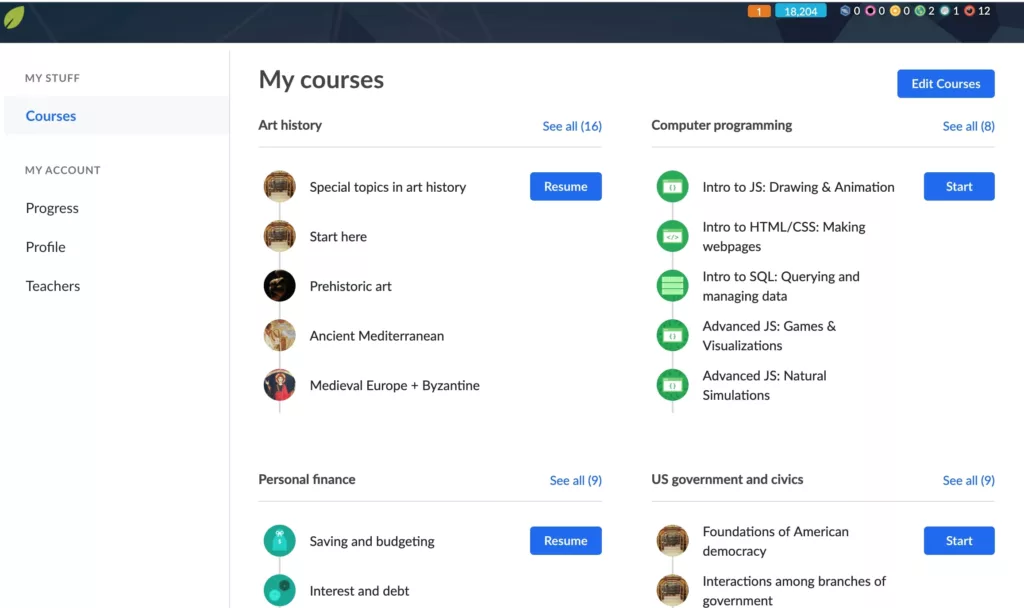Khan Academy Review – How Helpful is It?
Hello, learners! Have you ever needed a personal tutor available whenever you needed, without the usual costs? Welcome to Khan Academy. 📚 This online platform is a game-changer, offering a world-class education that’s accessible to everyone. Whether you’re a student needing a bit more clarity on school subjects, or an adult learner exploring new fields, Khan Academy has something for you. In this article, we’re going to delve deep into its features, benefits, and a few areas where it could do better. So, buckle up for an informative ride!
What is Khan Academy?
Khan Academy is a non-profit educational organization with a digital learning platform that provides a free, world-class education for anyone, anywhere. Established in 2008 by educator Salman Khan, it started as a simple tool to help tutor his cousins remotely. Today, it has evolved into a platform serving millions of students across the globe.
The platform offers practice exercises, instructional videos, and a personalised learning dashboard that empowers learners to study at their own pace, inside and outside of the classroom. The resources span multiple subjects including mathematics, science, computer programming, history, art history, economics, and more.
Khan Academy also partners with institutions like NASA, The Museum of Modern Art, The California Academy of Sciences, and MIT to offer specialised content. It’s not just for students – teachers, parents, and adult learners can also benefit from the vast resources available on the platform.
In a nutshell, Khan Academy is a comprehensive, accessible, and flexible tool for online learning, offering resources to enhance traditional education and provide opportunities for continued learning beyond the classroom.
Features of Khan Academy

Khan Academy is a robust educational platform loaded with a wide array of features designed to make learning accessible, engaging, and personalised. Here are some of its key features:
1. Comprehensive Course Catalog
Khan Academy’s course library covers a wide range of subjects from basic math to college-level calculus, grammar to storytelling, AP Physics to Art History, and more. There’s virtually no limit to what you can learn on this platform.
2. Personalised Learning Dashboard
This feature allows learners to track their progress, set goals, and get recommendations on what to study next. The platform learns from your strengths and weaknesses and tailors content to your needs.
3. Interactive Exercises
The platform offers interactive exercises with immediate feedback, which helps students practice and solidify their understanding. These exercises often follow instructional videos to ensure comprehension of the material.
4. Video Lessons
These are the backbone of Khan Academy. The lessons, delivered by subject matter experts, are clear, concise, and engaging. They can be paused, rewound, and rewatched as many times as necessary.
5. Mastery Challenges and Unit Tests
Khan Academy allows learners to test their understanding and mastery of a subject with unit tests and mastery challenges.
6. Tools for Parents and Teachers
Khan Academy provides tools for parents and teachers to monitor a student’s progress, identify areas for improvement, and tailor the learning experience to individual needs.
7. Accessibility
Khan Academy is accessible on various devices including computers, tablets, and smartphones, which means learning can happen anytime, anywhere.
How Does Khan Academy Work?
Using Khan Academy is a straightforward process that begins by creating a free account. Here’s how you can get started and make the most out of the platform:
1. Sign Up. Create an account on the Khan Academy website. This is a simple process that requires just an email address. You can also sign up using a Google or Facebook account. Upon signing up, you’ll be asked whether you’re a learner, teacher, or parent, which helps the platform customize your experience.
2. Select Your Learning Goal. Khan Academy will prompt you to select your learning goal based on your current education level, ranging from early learners to college students and beyond. You can also select “Lifelong Learner” if you’re interested in exploring topics beyond traditional education.
3. Choose Your Course. Once your account is set up, you can browse the extensive course catalog. Courses are grouped into subjects, and within each subject, you’ll find various topics and subtopics. Each course provides a detailed syllabus so you can understand what it covers before you start learning.
4. Start Learning. Each course typically starts with an introductory video followed by practice exercises. As you move through the course, you’ll complete a series of lessons, quizzes, and unit tests. Each step is designed to solidify your understanding of the subject.
5. Track Your Progress. As you work through your chosen courses, Khan Academy’s personalized learning dashboard will track your progress, display your strengths and weaknesses, and suggest next steps for your learning journey.
Khan Academy leverages technology to offer a personalised learning experience. The platform encourages self-paced learning, enabling you to learn at your own speed, review topics as needed, and move on when you’re ready. Whether you’re supplementing your traditional education or exploring new subjects out of interest, Khan Academy provides a flexible, learner-centric environment.
The Course Catalog on Khan Academy
Khan Academy boasts an impressive catalog of courses that span a wide variety of subjects, allowing learners of all ages to find content that matches their educational needs and personal interests. The breadth and depth of the course offerings make it a valuable resource for both supplementary and self-directed learning.
1. Maths. From early math for young learners to advanced calculus, statistics, and trigonometry, Khan Academy’s math curriculum is one of its most robust. It’s known for breaking down complex math concepts into digestible, understandable lessons.
2. Science. Khan Academy offers an extensive array of science courses, including biology, physics, chemistry, and more. It even includes AP-level courses and health and medicine related content.
3. Computing. For those interested in learning to code, Khan Academy offers courses in computer programming, computer science, and more. These courses include JavaScript, HTML/CSS, and SQL, among others.
4. Humanities. Courses here include art history, grammar, storytelling, and American civics. This category also includes a variety of AP-level classes for high school students.
5. Economics and Finance. This covers a wide range of micro and macroeconomics topics, finance, and even entrepreneurship.
6. Test Prep. Khan Academy also provides test prep courses for standardized tests such as the SAT, LSAT, MCAT, and more.
Each course is organised into units, and each unit includes lessons, practice exercises, and quizzes. The platform provides learners with a structured way to navigate their education, ensuring they get a comprehensive understanding of the subject matter.
The Learning Experience on Khan Academy
One of the standout aspects of Khan Academy is its user-friendly and interactive learning experience. Here’s what you can expect when you dive into learning with Khan Academy:
1. Instructional Videos. Every topic begins with instructional videos which are short, simple, and to the point. The videos employ visuals and simple language to explain complex concepts, making it easy for students to grasp the subject matter. Plus, you have the flexibility to pause, rewind, and rewatch as needed.
2. Interactive Exercises. Following the instructional videos, learners are presented with interactive exercises to apply the concepts they’ve just learned. These exercises provide instant feedback, allowing students to correct mistakes, learn from them, and reinforce their understanding.
3. Personalised Learning. Khan Academy’s platform personalises the learning experience by recommending what to study next based on your performance. This allows learners to focus on areas where they need more practice, ensuring a solid understanding of each subject.
4. Progress Tracking. Khan Academy provides learners with a dashboard to track their progress. It shows which skills you’ve mastered and which ones need more work. This tracking empowers learners to take ownership of their education and see their growth over time.
5. Flexibility. One of the biggest advantages of Khan Academy is its flexibility. The self-paced learning environment allows learners to set their own pace and schedule, accommodating various learning styles and needs.
6. Community Support. Khan Academy has a community feature where learners can ask questions and get help from other learners. This fosters a sense of community and collaborative learning.
Benefits of Khan Academy
Khan Academy is renowned for offering a variety of benefits that make it an excellent resource for learners worldwide. Here are some of the key benefits of using this platform:
1. ✅ Free Access. Perhaps the most significant benefit is that Khan Academy is completely free. This means anyone can have access to a high-quality education, regardless of their financial situation.
2. ✅ Wide Range of Subjects. Khan Academy offers a comprehensive range of subjects. Whether you’re looking to improve your math skills, learn a new language, or delve into art history, there’s likely a course for you.
3. ✅ Self-Paced Learning. The platform allows learners to progress at their own pace. This means you can spend as much time as you need to understand a concept fully before moving on.
4. ✅ Personalised Learning Experience. Khan Academy’s learning dashboard adapts to each user’s needs, providing personalized recommendations based on your strengths and weaknesses.
5. ✅ High-Quality Content. All the content on Khan Academy is developed by experts in their respective fields. The video lessons are clear, concise, and effective in explaining complex concepts.
6. ✅ Flexibility. You can access Khan Academy anytime, anywhere, as long as you have internet access. This allows learners to fit their education around their schedule.
7. ✅ Tools for Teachers and Parents. Khan Academy also provides resources for parents and teachers to monitor a student’s progress, making it a valuable tool for supplemental education.
Limitations of Khan Academy
While Khan Academy is an excellent resource for many learners, it does have a few limitations that are worth noting:
1. ❌ Lack of Personal Interaction. The platform lacks direct interaction between learners and educators. This means that if a student is struggling with a concept, they can’t ask the teacher for help in real time.
2. ❌ Not All Subjects Are Covered. Despite a wide range of courses, some subjects and specialized areas are not covered in Khan Academy’s course catalog. This may limit its usefulness for learners looking for very specific or niche topics.
3. ❌ Fewer Humanities Courses. While Khan Academy excels in providing a comprehensive curriculum for subjects like maths and science, its offerings in the humanities are comparatively fewer. For learners keen on these subjects, this could be a limiting factor.
4. ❌ Limited Feedback. While the platform provides instant feedback on practice exercises, this is based on predefined correct answers. It doesn’t cater to creative or critical thinking that can’t be evaluated by a fixed answer.
5. ❌ Learning Can Be Too Self-Directed. For learners who thrive in structured environments with clear guidance, the self-paced model can be challenging. Without the discipline to set and stick to a consistent learning schedule, some students may struggle.
Despite these limitations, Khan Academy remains a valuable educational tool for many learners. It’s important to understand these limitations in order to make the most out of the platform and to supplement its use with other resources when necessary.
Comparing Khan Academy with other Online Learning Platforms
In the world of online education, Khan Academy is one of many options. Let’s take a moment to compare Khan Academy with some other popular online learning platforms:
1. Khan Academy vs. Coursera: Coursera offers courses from universities and institutions worldwide, many of which provide certificates upon completion. However, many of these courses and their accompanying certificates come with a fee, unlike Khan Academy, which is completely free. While Coursera may offer more advanced, college-level and professional courses, Khan Academy excels in providing foundational and high school level knowledge.
2. Khan Academy vs. Udemy: Udemy is a platform that allows anyone to create and sell courses, leading to a vast variety of subjects and levels of quality. Udemy is excellent for specific, niche topics, or for learning practical skills, such as digital marketing or graphic design. However, most Udemy courses come at a cost. Khan Academy, on the other hand, offers a curated, quality-controlled catalog of courses for free, making it a more accessible option for many learners.
3. Khan Academy vs. EdX: Like Coursera, EdX partners with universities to offer courses and certificates. It also offers degree programs, unlike Khan Academy. However, many EdX offerings come at a cost, whereas Khan Academy remains free. Khan Academy’s interface and system might also be more user-friendly for younger students or those new to online learning.
4. Khan Academy vs. Duolingo: Duolingo specialises in language learning, using gamification to make learning a new language fun and interactive. Khan Academy, while it doesn’t have a specific focus on languages, offers a wider variety of subjects. If your focus is exclusively on language learning, Duolingo might be the better choice, but for a more comprehensive curriculum, Khan Academy comes out on top.
In conclusion, while Khan Academy has competition, its emphasis on a free, accessible, and quality education sets it apart from many other online learning platforms. Depending on your specific learning goals and financial situation, Khan Academy might be the perfect fit, or you might prefer to supplement it with one of these other platforms.
Who Should Use Khan Academy?
Khan Academy is a versatile platform that caters to a broad range of learners. Here are some groups who may find Khan Academy particularly beneficial:
1. K-12 Students. Khan Academy’s wide range of subjects and grade levels makes it a fantastic supplement to traditional schooling. Students can use the platform to reinforce what they’re learning in school, to catch up on topics they’re struggling with, or to advance beyond their current grade level.
2. Parents. Parents can use Khan Academy to help their children with homework or to facilitate home schooling. The platform provides tools for parents to monitor their child’s progress and understand their learning needs.
3. Teachers. Teachers can incorporate Khan Academy into their classrooms as an additional resource. They can assign videos and exercises to students, monitor their progress, and identify areas for improvement.
4. College Students. Khan Academy offers several advanced courses in subjects like calculus, biology, and physics, as well as test prep for exams like the MCAT and LSAT. This can be beneficial for college students needing a refresher on these subjects or preparing for exams.
5. Adult Learners. Adults looking to continue their education, switch careers, or just learn something new can benefit from Khan Academy’s diverse course offerings.
In essence, Khan Academy can be a valuable resource for anyone with a desire to learn. Its versatile offerings, personalized learning experiences, and free access make it a useful tool for learners from all walks of life.
Conclusion
In the digital age, the possibilities for learning are not just expanding – they’re being redefined. Khan Academy stands at the forefront of this educational revolution, fostering a love of learning by breaking down barriers to education.
From foundational knowledge to advanced concepts, Khan Academy offers a wealth of resources for everyone, creating a world where anyone can learn anything they wish. It’s about more than just passing tests – it’s about cultivating curiosity, fostering resilience, and nurturing a lifelong love for learning. Through its interactive, personalized learning experiences, Khan Academy equips learners with the tools to take charge of their education and thrive in a rapidly changing world.
While Khan Academy does an exceptional job of offering self-paced learning, we acknowledge that sometimes, personalized human assistance can further enhance understanding and performance. For those moments when learners need a bit more tailored guidance or a boost in their academic confidence, Edumentors, a reputable online tutoring platform, is an excellent choice.
Edumentors comprises a team of dedicated tutors who are students at top UK universities. They’ve navigated the academic path and have firsthand knowledge of what it takes to achieve top results. Offering an empathetic, relatable perspective, Edumentors tutors can guide other students along their learning journeys, providing tailored tips and strategies to excel in their studies. After all, every great learner can benefit from a great mentor.
Happy learning!







